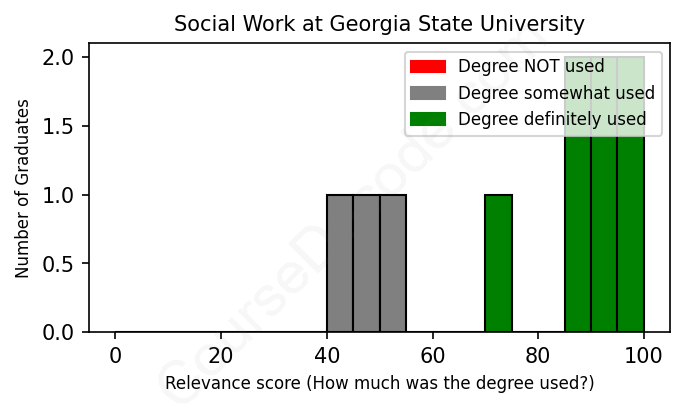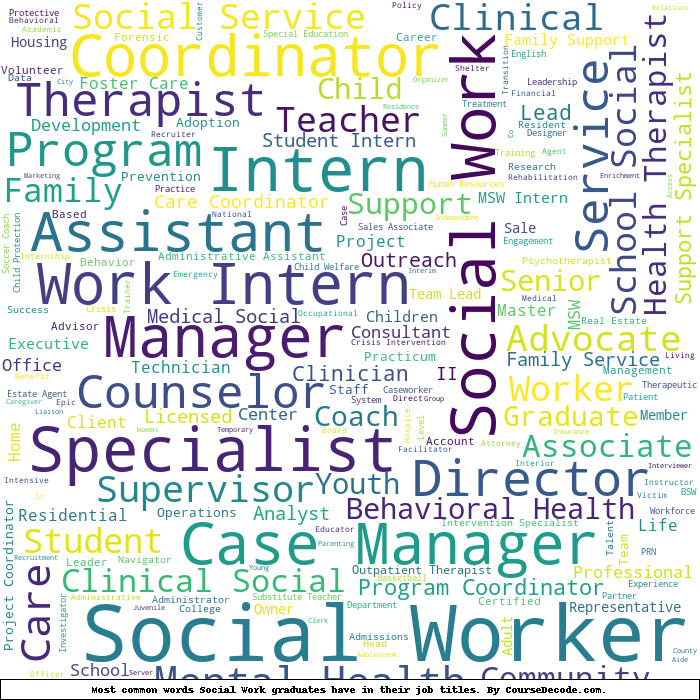
First, some facts. Of the Social Work graduates from Georgia State University we've analyzed , here's how many have used (or NOT used) their degree in their career:

These are estimates based on AI analysis of 10 LinkedIn profiles (see below).
The verdict? Above average. Overall, with an average relevance score of 77%, Social Work graduates from Georgia State University have a higher likelihood (+10%) of finding work in this field compared to the average graduate across all fields:
And for comparison, here's the chart for all profiles we've looked at across all degrees.
Also, after graduating, 60% of these graduates have pursued further education other than another Bachelor's degree (such as a Masters degree or other), compared to the average across all profiles of 35%. This suggests you may need more than just a Bachelors degree to be competitive as a Social Work graduate.
See the details:
|
Relevance score: 87% We think this person has gone into a career highly relevant to their degree. We think this person has gone into a career highly relevant to their degree.
DEGREE INFOGraduated in 2020 from Georgia State University with a Bachelor of Arts - BA in Social Work. Also pursued further education since (see below). JOB HISTORY SINCE GRADUATIONCase Management Intern SummitRidge Behavioral Health Hospital Aug 2020 - May 2021 Customer Service Agent  Alorica Jun 2021 - Aug 2021 Graduate Research Assistant  Georgia State University Jul 2021 - Jun 2022 Project Management Intern  Women's Resource Center to End Domestic Violence Aug 2021 - Jun 2022 youth and family coordinator  The Multi-Agency Alliance for Children Apr 2022 - Present FURTHER DEGREES DONE SINCE GRADUATINGMaster of Social Work - MSWGeorgia State University 2020 - 2022 ABOUTAn upcoming Georgia State graduate with my Master's in Social Work. I have spent most of my career working with children and families and have recently branched out into more large scale programatic work. I have gained experience in childcare, case management, research, crisis management, and counseling. |
The top 10 most common jobs done by the graduates we've analyzed (ranked most common to least) are:
After examining the career paths of graduates from Georgia State University's Social Work program, it's clear that many have taken on roles that either directly connect to social work principles or require transferable skills. Common jobs include case managers, program coordinators, and roles in diversity and equity, particularly in academic and community service settings. For instance, many graduates have found themselves working in positions like VASH-HUD Social Worker or Readjustment Counselor, which involve extensive interaction with clients and direct application of social work knowledge. Others have excelled in roles such as Program Manager or Coordinator at organizations focusing on diversity and community outreach, where social work principles of advocacy and support are essential.
However, not all jobs directly relate to social work. Positions like executive assistant or even roles in real estate, while possibly utilizing some soft skills from a social work background, don’t engage with the core competencies expected of a social worker. Overall, graduates seem to have a decent mix of jobs that are relevant to social work and those that veer off into other professional areas. It shows that while social work provides a strong foundation, some graduates choose diverse paths that may not fully encompass their years of education, highlighting the versatility of their skills in various fields.
Here is a visual representation of the most common words in job titles for Social Work graduates (this is across all Social Work graduates we've analyzed, not just those who went to Georgia State University):

When looking at the career trajectories of Social Work graduates from Georgia State University, it's clear that many of them kick off their careers with jobs directly related to social work. In their early post-graduation years, roles like case manager, social worker, and program coordinator seem to be the most common. These positions typically involve working directly with individuals or communities to provide support and services, which aligns well with the skills and knowledge they gained during their degree. As they gain experience, some graduates transition into related fields like program management, diversity, and inclusion roles, or higher education positions like adjunct professorships, indicating a broadening of their expertise over time.
Fast forward a few years, and many graduates appear to be growing into leadership roles or diversifying their careers. For example, some have become directors or supervisors within their organizations, while others have taken on roles in different but related sectors, such as real estate or behavioral health services. It's notable that while a fair number still stick closely to social work, others venture into areas that, at first glance, seem a bit removed from their original focus. This shift might reflect the versatility of a social work degree and the range of transferable skills it offers. Overall, while some trajectories are deeply rooted in social work, others reveal a mix of experiences, showing that graduates are finding their way into various aspects of helping professions alongside absolutely crucial roles in community and social services.
Getting a Bachelor’s degree in Social Work at Georgia State University is about what you’d expect for a degree in this field—it's challenging but manageable if you’re motivated. You’ll be tackling a mix of theory, ethics, and practical skills, plus there’s a good amount of reading and writing involved. Some students find it easier because they're really passionate about helping others, while others might struggle with the emotional aspects of the material. Overall, it’s definitely not a walk in the park, but if you put in the effort and stay organized, you can totally handle it!
Most commonly, in the LinkedIn profiles we've looked at, it takes people 2 years to finish a Bachelor degree in Social Work.
From looking at the job histories of these Georgia State University social work grads, it seems like they've had a pretty mixed bag when it comes to making decent money. Many of them started with entry-level positions and internships in social work or related fields, which typically don't pay that well, especially right out of college. However, as time went on, some climbed the ladder to more senior roles, like Chief Diversity Officer and Medical Social Worker, which usually come with better salaries. Overall, while some of these folks have likely started to earn a more comfortable income in their later positions, the early years probably meant tighter budgets and less financial freedom, but now they seem to be making strides toward more lucrative roles.
Here is a visual representation of the most common words seen in the "about" section of LinkedIn profiles who have a Bachelor degree in Social Work (this is across all Social Work graduates we've analyzed, not just those who went to Georgia State University). This may or may not be useful:

Here are all colleges offering a Bachelor degree in Social Work (ordered by the average relevance score of their Social Work graduates, best to worst) where we have analyzed at least 10 of their graduates: